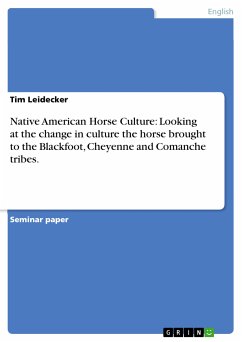Seminar paper from the year 2000 in the subject American Studies - Culture and Applied Geography, grade: 1,7 (A-), Friedrich-Alexander University Erlangen-Nuremberg (Institute for American Studies), course: Native American Indian Stimulations and Philosophies, language: English, abstract: When Europeans first set foot on the new continent they discovered that it had al-ready been settled. At some point ethnographers became interested in those aborigi-nal cultures. They intended to “cultivate” the “savages”. During those times hardly anyone was interested, let alone wrote about Native American women and the not unimportant part they played in this unknown culture. If women were mentioned at all, only their duties in the household were described. It is exactly this lack of interest that today makes it hard to get valid information about the life of Native American women at that time. This ignorance caused the white society to form a distorted picture, where the role of American Indian women matched the rather passive one white women had in their own society. They did not comprehend the importance the family represented as the central institution of society, nor the part women played outside the family, or the freedom they had and the rules they needed to obey. It was only in the 1920s, when the image of the “vanishing race” was created, that more material was collected about American Indian women. Stereotypes developed, because the information about America’s indigenous peo-ples was presented to us by a third person. This “medium” described the object of interest in his or her own Euro-centric terms and with a certain intention, in this case the want for the land the Natives inhabited. Then the information got generalized and eventually produced an image that mostly had nothing to do with the original object. The question therefore is: “How did and do Native women, along with others, cre-ate Native America?” (Klein & Ackerman: 3)
Bitte wählen Sie Ihr Anliegen aus.
Rechnungen
Retourenschein anfordern
Bestellstatus
Storno









